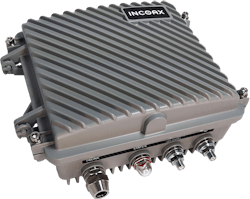Following the release of the InCoax D2501, which was unveiled at this year's Broadband Forum UFBB Virtual Conference (Sep. 21-23), deploying multi-gigabit and gigabit symmetrical broadband services in small and mid-sized multi-dwelling units (MDUs) is now very feasible. The Swedish manufacturer contends that, via the new device, operators and service providers across Europe and North America will more easily be able to extend fiber GPON, XG-PON, XGS-PON and Active Ethernet services with minimal construction work, over existing in-building coaxial infrastructure.
According to InCoax:
The InCoax D2501 DPU (Distribution Point Unit) extends the northbound backbone GPON, XG-PON, XGS-PON or Active Ethernet fiber network. D2501 is a Broadband Forum TR-301/TR-419 based DPU for 8, 16 or 31 modems making it the versatile choice for small and mid-sized MDU deployments. [Via the D2501] the broadband connection point (antenna outlet) is located at the heart of the apartment (unit) for easy smart TV and IPTV services access, rendering additional internal wiring unnecessary.
The [unit's] water-resistant IP-67 casing allows for indoor or outdoor installation in any FTTep (Fiber To The extension point) location. The common Reverse Power Feed option is available when local power is not present at the mounting location. Zero Touch Provisioning of system set-up allows for fast and easy installation of systems and effective use of human resources that saves time and money. It is managed through TR-069, NETCONF/YANG and SNMP protocols for incorporation to operators’ existing management and provisioning systems, making it the perfect complement to fiber roll-out strategies in North America and Europe.
The reliable and ingress safe InCoax technology, communicates using the well-established MoCA standard present in millions of applications worldwide. It can co-exist with DOCSIS, terrestrial-, cable- and satellite-TV, enabling flexible deployments that lower market entry thresholds.
InCoax adds that its fiber access extension technology solves the "last mile challenge" of providing gigabit or multi-gigabit broadband services to MDUs. The company notes its D2501 cost-effectively uses existing in-house coax cable infrastructure, positioning it as a time-saving alternative to pulling new cables, as well as helping sites to meet sustainability targets. This subsequently increases property reach and grows the addressable market size for operators, contends InCoax.
As further explained the manufacturer:
The D2501 modem can be self-installed by tenants, saving time and money when installing and launching services. It can also be rolled-out in stages which shortens time for revenue, lowers initial CAPEX and contributes to faster overall return on investment (ROI) for operators. The system offers symmetrical broadband services with low latency, and a fiber-like experience that outperforms any legacy technology such as G.fast to match the increasing market demand for seamless streaming, gaming and working from home.
“InCoax continues to facilitate multi-gigabit and gigabit broadband speeds for subscribers and our technology ensures that operators can undertake fast and non-intrusive installations,” concludes InCoax head of marketing, sales and product management, Helge Tiainen. “The latest release of D2501 is the perfect complement to operators’ FTTH strategies to meet fiber roll-out targets across Europe and North America.”
Learn more at www.incoax.com.
